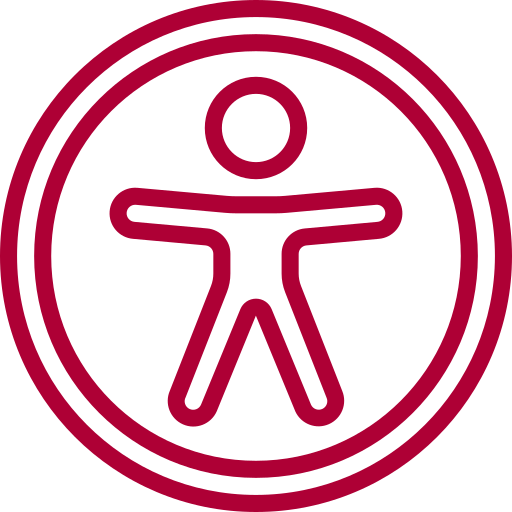I decided to carry out some research into the promotion of services available to deaf people through council websites after reading a report by RAD (Royal Association for Deaf people) called ‘Access denied? Deaf people and advice services in England’.1 The report, published in 2021, investigated the issues and experiences encountered by deaf people in accessing information and advice services in BSL (British Sign Language) via English local authorities.

The report revealed a mixed picture on the provision of advice services available in BSL. I was intrigued to find out more about this and the experiences that deaf people have when trying to get in contact with their local authority via a council public website. I wanted to try to find out about the resources that currently exist and how councils currently promote them to deaf people via their public websites. In part I also carried out this research to improve my own knowledge of BSL and share what I find out with those directly involved in running council websites in the UK and Ireland.
I’d like to stress that my research is not intended to be critical of the provision of BSL services in local authorities. Instead it is to try to shine a light on the user experience that deaf people have when trying to get in contact with a local authority to find out about and request services.
Before moving onto the research I think it would be helpful to provide some background to BSL and other resources that are available to deaf people.
What is BSL (British Sign Language)?
British Sign Language (BSL) is the signed language of the deaf community in the UK. It is a rich and complex language which involves a combination of hand shapes, facial expressions, lip patterns and body language. It has its own grammar and sentence structure and is not designed as a signed equivalent of English. Providing information and advice in BSL – the first or preferred language of deaf people in the UK – is critical, providing equitable access and empowerment.
There are estimated to be around 87,000 deaf BSL users in the UK, though the figure is likely to be much higher.2
What is ISL (Irish Sign Language)?
As my research is covering councils in the Republic of Ireland and Northern Ireland I should say a little about ISL (Irish Sign Language) which is used in both countries.
Irish Sign Language is more closely related to French Sign Language (LSF) than to British Sign Language, though it has influence from both languages. According to Ethnologue3, the language has influence from both LSF and BSL, as well as from signed French and signed English, BSL having been introduced in Dublin in 1816.4
What is Text Relay?
Text relay offers text-to-speech and speech-to-text translation services.5 A relay assistant in a call centre acts as an intermediary, enabling people with hearing or speech impairments to communicate with other people over the telephone.
Research methodology
I checked each council website in UK and Ireland to find out if it is possible to find out about BSL, ISL and text relay service. I then noted down my experiences, which I added to an Airtable which can be found at the bottom of this blog post. I checked the following locations on each council website:
- contact us page
- homepage (header and footer)
- accessibility statement for the website
- search facility (using a variety of search terms with included BSL, ISL sign language, text relay, services for deaf people
Finding information about about services for deaf people on the contact us page
When I started my research I naively expected that the contact page would be the most likely place for deaf people to visit to find out about any services that would allow them to get in contact with their local authority. The contact page does indeed provide this information for councils, but certainly not as many as I expected to find.
| Information about services for deaf people can be found on the contact us page | Yes | No |
| Number of councils | 51 (12.5%) | 358 (87.5%) |
Finding information about about services for deaf people on the homepage
The homepage was the other location that I expected to signpost services for deaf people. This did not prove to be a very popular location to promote these services.
| Information about services for deaf people can be found on the homepage | Yes | No |
| Number of councils | 6 (1.5%) | 403 (98.5%) |
Finding information about about services for deaf people in the website’s Accessibility statement
The Accessibility Statement proved to be the most popular location to find out about services available to deaf people and how to access them.
| Information about services for deaf people can be found in the website’s Accessibility Statement | Yes | No |
| Number of councils | 102 (24.9%) | 307 (75.1%) |
All councils are required to publish an accessibility statement. It is one of the requirements they must meet under accessibility regulations6. Within the statement there is minimum legal wording that needs to be included. This includes a section on feedback and contact information in which it allows people to request information in alternative formats if they cannot be accessed via the website :
‘If you need information on this website in a different format like accessible PDF, large print, easy read, audio recording or braille:
- email [email address]
- call [phone number]
- [add any other contact details]
We’ll consider your request and get back to you in [number] days.’
It is in this section that councils can include information about services available to deaf people (BSL, ISL and text relay). This does indeed prove to be a popular location to place this information. Unfortunately in many cases it is the only place that this information can be found on the website. I would not expect the accessibility statement to be the primary location for such information.
Finding information about about services for deaf people via the search facility
If I failed to find any reference to BSL, ISL or text relay in the above locations I checked out the search facility on the site to see if I had missed anything. This helped to identify relevant content in other sections of the websites, such as social care or reasonable adjustments and translations.
I worked as methodically and thoroughly through this review, often returning to councils where no information could be found, just to make sure I hadn’t missed anything. With all manual checking though things may have been missed, so if you find any errors or omissions for your council please do get in contact and let me know.
Councils using BSL / ISL providers to deliver services
78 councils (19.1%) provide deaf people with direct access to BSL or ISL using a provider to deliver this service on their behalf.
| Councils using BSL / ISL providers to deliver services | Yes | No |
| Number of councils | 78 (19.1%) | 331 (80.9%) |
Contact Scotland BSL is the most popular of these, a service which as the name suggests is available to anyone in Scotland. Strangely, however, I only found it mentioned in 28 out of 32 Scottish councils (87.5%). Contact Scotland BSL is a Scotland-wide cross-service, delivered by Sign Language Interactions (SLi). The second most popular BSL service provider is SignVideo.
| BSL / ISL Provider | Number of councils |
| Contact Scotland BSL | 28 (6.85%) |
| SignVideo | 27 (6.6%) |
| SignLive | 14 (3.42%) |
| InterpretersLive! | 8 (1.96%) |
| AA Global | 1 (0.244%) |
| No Provider | 331 (80.9%) |
BSL/ISL can be arranged if requested
134 councils (32.8%) in the UK and Ireland say that BSL/ISL can be arranged if requested. Councils providing immediate access to BSL/ISL services are included in this figure (78 councils). In the remaining councils (56) people have to get in contact to specifically request being contacted by BSL / ISL. In most cases the ability to request BSL/ISL is mentioned on the council’s Accessibility Statement. Some councils detailed a target date for arranging BSL, which varied from 7 to 14 working days.
Is a text relay service available?
As mentioned above text relay offers text-to-speech and speech-to-text translation services. My research reveals that over a quarter of councils promote a text relay service. I suspect that other councils provide this service but do not promote it on their website.
| Councils promoting the availability of a text relay service | Yes | No |
| Number of councils | 115 (28.1%) | 294 (71.9%) |
Is a text relay number available?
The number of councils promoting a text relay service which then go on to provide a number is revealed below.
| Councils promoting a text relay service number | Yes | No |
| Number of councils | 90 (22%) | 319 (78%) |
Some closing thoughts
In general BSL/ISL and text relay services are often not that easy to find on council websites. I was unable to find any reference at all to BSL, ISL and/or text relay on 274 council websites (67%). On the websites that I found a mention only 51 (12.5%) councils did so on their contact us page. It was easier to find information on the accessibility statement (102 councils or 24.9%). I think it would be more helpful if councils added information about these services on both their contact us and their accessibility statement.
Some councils do promote BSL / ISL and text relay services well, such as Dundee City Council, Fife Council and the Royal Borough of Greenwich Council. I was also particularly impressed how Derbyshire County Council, Leeds City Council and Newham Council provide clear and thoughtful guidance on using BSL and text relay.
Footnotes
Help & Resources – British Deaf Association (bda.org.uk)
- RAD (Royal Association for Deaf People): Access denied? Deaf people and advice services in England -July 2021 ↩︎
- Help & Resources – British Deaf Association (bda.org.uk) ↩︎
- Ethnologue: Irish Sign Language ↩︎
- BDA: What is ISL? ↩︎
- Ofcom: Calls from and to people with hearing and speech impairments: a guide to the Text Relay service ↩︎
- GOV.UK: Sample accessibility statement ↩︎
About this research
Over the next year I will be extending my research to include a range of other topics, which I hope will be of interest and use throughout local government.
I will continue to update the BSL and text relay Airtable below as and when I find out about any changes. Please do check out the Extensions section of the Airtable as this enables you to search and visualise the data presented on the database.
If you spot any errors or want to report any changes please do get in contact.

